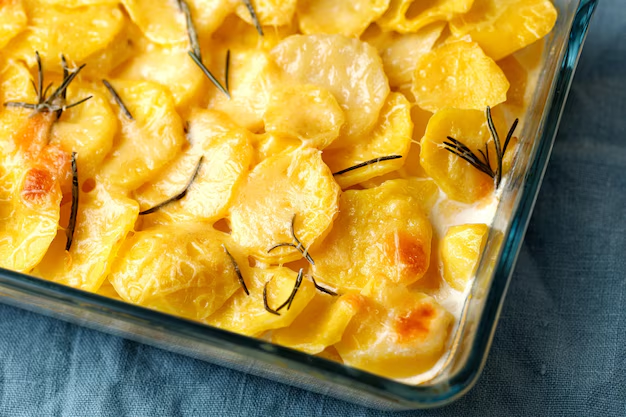How Long Can You Extend the Deliciousness of Baked Potatoes in the Refrigerator?
Baked potatoes are a timeless comfort food, perfect as a side dish or even as a main course when loaded with toppings. However, after the meal ends, a common question arises: How long do these spuds remain safe and tasty when stored in the refrigerator? Understanding the shelf life of baked potatoes not only helps prevent food waste but also ensures food safety. Let's dive into the nuances of storing baked potatoes and explore best practices to extend their usability.
🥔 The Basics of Baked Potato Storage
How Long Are Baked Potatoes Good For?
Baked potatoes, when stored properly in the refrigerator, can typically last 3 to 5 days. This time frame ensures they remain safe to eat while preserving their texture and flavor. Beyond this period, they may start to lose quality and can potentially become unsafe to consume.
The Science Behind Spoilage
The longevity of baked potatoes is influenced by several factors, including temperature, moisture, and exposure to air. Spoilage bacteria can flourish if potatoes are left at room temperature for too long, especially if they were not cooled quickly after baking.
🔑 Key Practices for Storing Baked Potatoes
Proper Cooling and Storage
- Allow to Cool: After baking, allow potatoes to cool but not for more than two hours at room temperature to minimize bacterial growth.
- Refrigerate Promptly: Once cooled, store the potatoes in the refrigerator. Use airtight containers or wrap them tightly with aluminum foil or plastic wrap to prevent them from drying out.
- Avoid Aluminum Foil: It's recommended to avoid storing directly in aluminum foil due to potential botulism risk. Instead, use it to wrap them loosely, allowing some air passage, or opt for secure food containers.
Recognizing Spoiled Potatoes
When deciding if your stored baked potatoes are still good to eat, watch for these signs of spoilage:
- Unpleasant odor: A sour or rotten smell indicates spoilage.
- Mold: Visible mold growth is a clear signal the potato has gone bad.
- Slimy or off-texture: A mushy or slimy feel implies the potatoes are no longer fresh.
🌡️ The Importance of Temperature Control
Maintaining the right temperature is crucial for the longevity of baked potatoes. Here’s how to ensure optimal storage conditions:
Refrigerator Temperature: Keep your fridge between 35°F (1.6°C) and 40°F (4.4°C). This range is optimal for halting bacterial growth.
Avoid Fluctuations: Consistent temperatures prevent the potatoes from sweating, which leads to spoilage.
❄️ Can Baked Potatoes Be Frozen?
Yes, But with Caution
Baked potatoes can be frozen to extend their lifespan even further, but freezing can affect texture. Here’s how to do it correctly:
- Cool Thoroughly: Make sure the potatoes are completely cooled before freezing.
- Wrap Properly: Use freezer-safe bags or airtight containers to prevent freezer burn.
- Defrost Carefully: When ready to use, thaw them in the refrigerator rather than on the countertop to ensure even thawing.
Freezing in Action: Tips and Tricks
- Pre-Portion: Consider slicing the potatoes or portioning them before freezing for easy reheating.
- Add Toppings Later: It’s best to freeze potatoes plain and add toppings like cheese, butter, or bacon after reheating to retain the best textures.
🧂 Making the Most of Leftover Baked Potatoes
The versatility of baked potatoes means there are countless ways to repurpose leftovers. Here are a few ideas:
Delicious Recipe Ideas
- Loaded Potato Skins: Use hollowed-out potatoes as a base, topped with cheese and bacon.
- Potato Salad: Cube and mix with mayonnaise, Dijon mustard, and herbs for a fresh potato salad.
- Breakfast Hash: Dice into a skillet with onions and bell peppers for a hearty morning meal.
📋 Quick Reference Summary
Here's a helpful summary to keep your baked potatoes fresh and safe:
- Shelf Life: 3 to 5 days in the refrigerator.
- Storage Method: Use airtight containers or wrap tightly to prevent drying.
- Temperature: Maintain a fridge temperature of 35-40°F (1.6-4.4°C).
- Freezing: Can freeze after cooling, but expect textural changes.
Top Tips for Storage Success
- 🕐 Cool Promptly: Avoid leaving potatoes at room temperature for more than 2 hours.
- 🌬️ Wrap Wisely: Preferably avoid aluminum foil for long-term storage.
- 🤔 Inspect Regularly: Check for mold, odors, or texture changes before consuming.
👩🍳 Beyond Preservation: The Joy of Reinvention
Leftover baked potatoes should never be seen as a burden. Instead, view them as an opportunity to create new culinary experiences. With proper storage techniques, you’ll not only minimize waste but also maximize the longevity and enjoyment of your meals.
Embrace these insights to help you enjoy baked potatoes safely and deliciously, knowing that your approach both preserves quality and protects health. Whether reheating for another meal or embarking on a new recipe, these comforting spuds remain a staple worth keeping in your kitchen rotation. Remember, the right storage can make all the difference.

